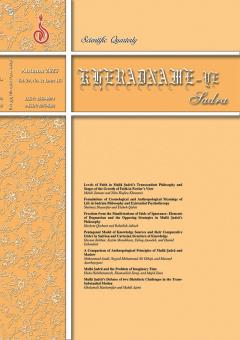Freedom from the Manifestations of Idols of Ignorance: Elements of Dogmatism and the Opposing Strategies in Mullā Ṣadrā’s Philosophy
Subject Areas : ملاصدراپژوهی و اندیشۀ حکمت متعالیهHashem Qorbani 1 * , Rohollah Adineh 2
1 - Associate Professor, Islamic Studies Department, Imam Khomeini International University, Qazvin, Iran
2 - Assistant Professor, Islamic Philosophy and Wisdom Department, Imam Khomeini International University, Qazvin, Iran
Keywords: Rationality, idols of ignorance, mental stagnancy, dogmatism, strategy, Mullā Ṣadrā,
Abstract :
Ignorance and dogmatism have always existed in various historical periods of epistemological disciplines and revealed their faces in their opposition to knowledge. Ignorance appears through separation from the necessities of knowledge. The spread of ignorance in the culture of social relationships threatens the place of scientific resources and epistemological cradles. Through breaking the idols of ignorance, Mullā Ṣadrā writes about the objective manifestations of such idols in society. He believes that the promotion of social relationships demands the creation of cradles for knowledge, and any kind of ignorance in this regard will result in the dominance of epistemological inefficiency. Through a semantic analysis of ignorance, Mullā Ṣadrā talks about one of its most obvious manifestations, which is dogmatism. He maintains that moral norms and epistemological necessities fade away in a dogmatism rooted in ignorance. The criticism of ignorance and reproach of ignorants in Mullā Ṣadrā’s portrayal of this phenomenon is manifested based on four elements: 1) lack of verification of mental understanding in conformity to reality, 2) lack of derivation of comparative elements particularly in the light of its functional dimensions such as unjust evaluation, 3) mental stagnation, and 4) defective social competition, which refers to the wrong quality of efficiency. When criticizing the culture of his time, Mullā Ṣadrā refers to the rise of ignorance behind the guise of knowledge as an important epistemological pest. In all his criticisms of this stagnant process, he introduces the weakness of true knowledge in society, spread of social foolishness, corruption of social justice, and frailty of the epistemological foundations of society as its most important outcomes. He propounds the treatment of ignorance in the light of a wise method of living while attending to its necessary elements.
پاتوچکا، یان (1378) سقراط: آگاهی از جهل، ترجمۀ محمود عبادیان، تهران: هرمس.
پل، ریچارد؛ الدر، لیندا (1400) تفکر انتقادی، ترجمۀ اکبر سلطانی و مریم آقازاده، تهران: اختران.
پوپر، کارل ریموند (1379) سرچشمه¬های دانایی و نادانی، ترجمۀ عباس باقری، تهران: نی.
تاکمن، باربارا (1399) تاریخ بی¬خردی، ترجمۀ حسن کامشاد، تهران: کارنامه.
تای، مایکل (1393) فلسفه آگاهی، ترجمۀ یاسر پوراسماعیل، تهران: حکمت.
محقق¬داماد، سیدمصطفی (1398) در دادگاه جهل مقدس، تهران: سخن.
ملاصدرا (1378) المظاهر الإلهیة فی أسرار علوم الکمالیة، تصحیح و تحقیق سیدمحمد خامنه¬ای، تهران: بنیاد حکمت اسلامی صدرا.
ملاصدرا (1381الف) کسر اصنام الجاهلیة، تصحیح و تحقیق محسن جهانگیری، تهران: بنیاد حکمت اسلامی صدرا.
ملاصدرا (1381ب) المبدأ و المعاد، تصحیح و تحقیق محمد ذبیحی و جعفر شاه¬نظری، تهران: بنیاد حکمت اسلامی صدرا.
ملاصدرا (1381ج) رساله سه اصل، تصحیح و تحقیق سیدحسین نصر، تهران: بنیاد حکمت اسلامی صدرا.
ملاصدرا (1382) الشواهد الربوبیة فی مناهج السلوکیة، تصحیح و تحقیق سیدمصطفی محققداماد، تهران: بنیاد حکمت اسلامی صدرا.
ملاصدرا (1383الف) الحکمة المتعالیة فی الأسفار الأربعة، ج1، تصحیح و تحقیق غلامرضا اعوانی، تهران: بنیاد حکمت اسلامی صدرا.
ملاصدرا (1383ب) الحکمة المتعالیة فی الأسفار الأربعة، ج3، تصحیح و تحقیق مقصود محمدی، تهران: بنیاد حکمت اسلامی صدرا.
ملاصدرا (1386الف) إیقاظ النائمین، تصحیح و تحقیق محمد خوانساری، تهران: بنیاد حکمت اسلامی صدرا.
ملاصدرا (1386ب) المفاتیح الغیب، تصحیح و تحقیق نجفقلی حبیبی، تهران: بنیاد حکمت اسلامی صدرا.
ملاصدرا (1389الف) أسرار الآیات و أنوار البینات، تصحیح و تحقیق محمدعلی جاودان، تهران: بنیاد حکمت اسلامی صدرا.
ملاصدرا (1389ب) تفسیر القرآن الکریم، ج4، تصحیح و تحقیق محسن بیدارفر، تهران: بنیاد حکمت اسلامی صدرا.
Bowen, C. D. (1993). Francis Bacon: The temper of a man. New York: Fordham University Press.
Proctor, R. (2008). Agnotology; the Making and Unmaking of Ignorance. Stanford University Press.

